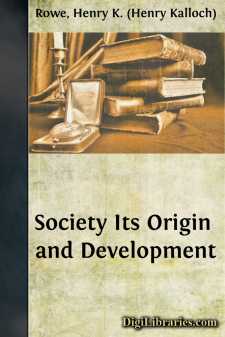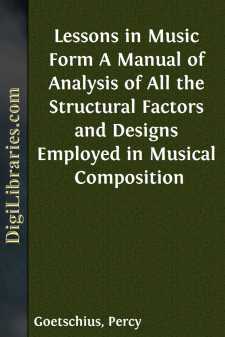Categories
- Antiques & Collectibles 13
- Architecture 36
- Art 48
- Bibles 22
- Biography & Autobiography 815
- Body, Mind & Spirit 144
- Business & Economics 28
- Children's Books 18
- Children's Fiction 14
- Computers 4
- Cooking 94
- Crafts & Hobbies 4
- Drama 346
- Education 58
- Family & Relationships 59
- Fiction 11829
- Games 19
- Gardening 17
- Health & Fitness 34
- History 1378
- House & Home 1
- Humor 147
- Juvenile Fiction 1873
- Juvenile Nonfiction 202
- Language Arts & Disciplines 89
- Law 16
- Literary Collections 686
- Literary Criticism 179
- Mathematics 13
- Medical 41
- Music 40
- Nature 179
- Non-Classifiable 1768
- Performing Arts 7
- Periodicals 1453
- Philosophy 65
- Photography 2
- Poetry 896
- Political Science 203
- Psychology 44
- Reference 154
- Religion 515
- Science 126
- Self-Help 85
- Social Science 82
- Sports & Recreation 34
- Study Aids 3
- Technology & Engineering 59
- Transportation 23
- Travel 463
- True Crime 29
Sort by:
CHARACTERISTICS OF SOCIAL LIFE 1. Man and His Social Relations.—A study of society starts with the obvious fact that human beings live together. The hermit is abnormal. However far back we go in the process of human evolution we find the existence of social relations, and sociability seems a quality ingrained in human nature. Every individual has his own personality that belongs to him apart from...
more...
by:
Herbert Feis
CHAPTER I—INTRODUCTORY Section 1. In any attempt to formulate principles for use in the settlement of wage disputes, past experience furnishes much guidance. What this experience consists of.—Section 2. Such principles as have been used in the settlement of wage disputes have usually resulted from compromise; reason and economic analysis have usually been secondary factors. However, industrial...
more...
by:
Justus Liebig
LETTER I My dear Sir, The influence which the science of chemistry exercises upon human industry, agriculture, and commerce; upon physiology, medicine, and other sciences, is now so interesting a topic of conversation everywhere, that it may be no unacceptable present to you if I trace in a few familiar letters some of the relations it bears to these various sciences, and exhibit for you its actual...
more...
I One of the most interesting of the many interesting stories of our civilization is the story of Music. It affords an intimate knowledge of the inner life of man as manifested in different epochs of the world's history. He who has failed to follow it has failed to comprehend the noblest phenomena of human progress. Mythology and legendary lore abound in delightful traditions in regard to the...
more...
PHILADELPHIA ICE CREAMS BURNT ALMOND ICE CREAM 1 quart of cream 1/2 pound of sugar 4 ounces of sweet almonds 1 tablespoonful of caramel 1 teaspoonful of vanilla extract 4 tablespoonfuls of sherry Shell, blanch and roast the almonds until they are a golden brown, then grate them. Put half the cream and all the sugar over the fire in a double boiler....
more...
CHAPTER I Any scheme of education must be built upon answers to two basic questions: first, What do we desire those being educated to become? second, How shall we proceed to make them into that which we desire them to be? In our answers to these questions, plans for education fall naturally into two great divisions. One concerns itself with ideals; the other, with methods. No matter how complex plans...
more...
by:
Percy Goetschius
CHAPTER I. INTRODUCTION. THE NECESSITY OF FORM IN MUSIC.—So much uncertainty and diversity of opinion exists among music lovers of every grade concerning the presence of Form in musical composition, and the necessity of its presence there, that a few general principles are submitted at the outset of our studies, as a guide to individual reflection and judgment on the subject. Certain apparently...
more...
by:
William Blake
INTRODUCTION Piping down the valleys wild, Piping songs of pleasant glee, On a cloud I saw a child, And he laughing said to me: "Pipe a song about a Lamb!" So I piped with merry cheer. "Piper, pipe that song again;" So I piped: he wept to hear. "Drop thy pipe, thy happy pipe; Sing thy songs of happy...
more...
PREFACE. Cynics may ask, how many have profited by the innumerable proverbs and maxims of prudence which have been current in the world time out of mind? They will say that their only use is to repeat them after some unhappy wight has “gone wrong.” When, for instance, a man has played “ducks and drakes” with his money, the fact at once calls up the proverb which declares that “wilful waste...
more...
I. LABORATORY REGULATIONS. The following regulations are laid down for observance in the Bacteriological Laboratories under the direction of the author. Similar regulations should be enforced in all laboratories where pathogenic bacteria are studied. Guy's Hospital. BACTERIOLOGICAL DEPARTMENT. HANDLING OF INFECTIVE MATERIALS. The following Regulations have been drawn up in the interest of those...
more...











